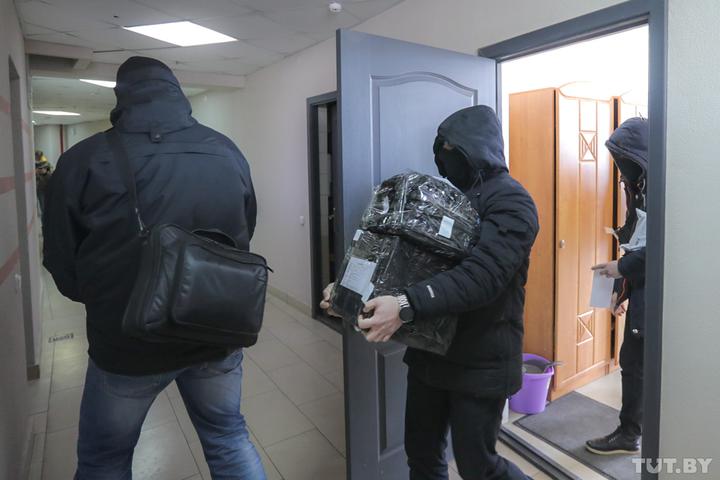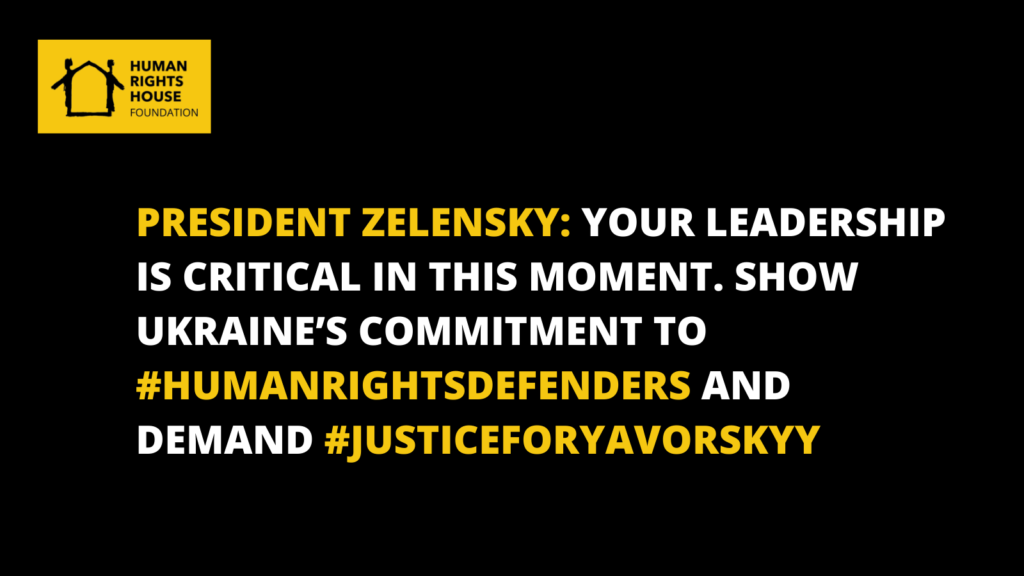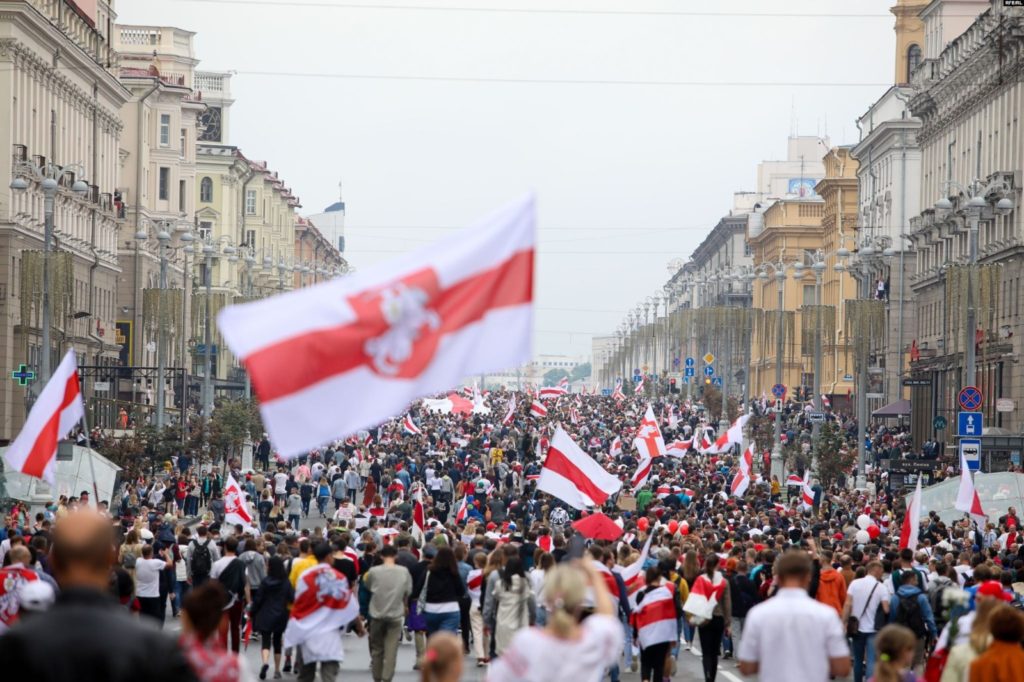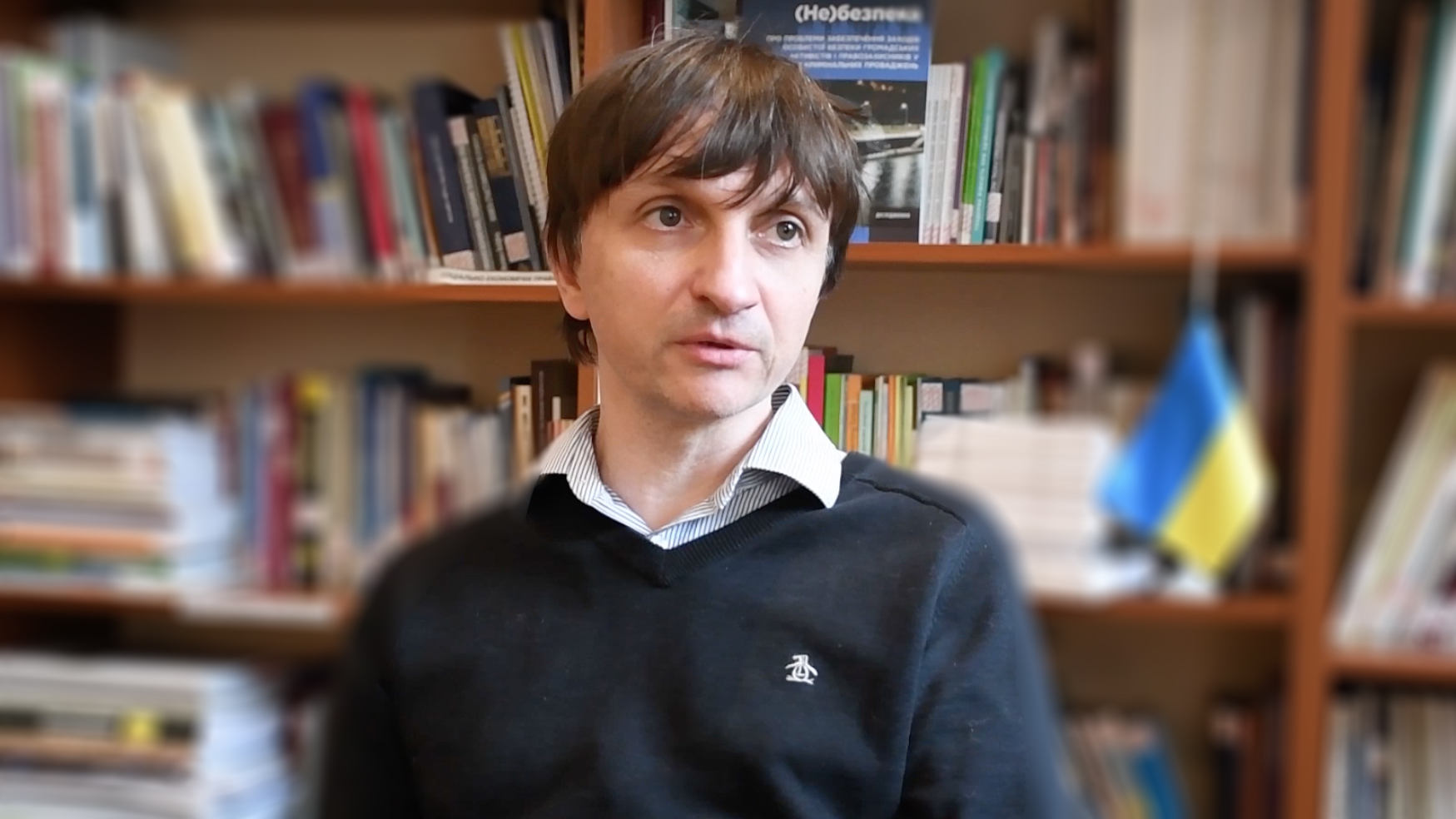Це інтерв’ю українською мовою можна прочитати тут.
[In Belarus], all major human rights organisations are under criminal investigation.
“Organisations and defenders are being accused of supporting and financing mass riots or preparing and training people to take part in mass riots.”
“In the last three months since the beginning of February, more than 200 searches of human rights defenders have taken place, there have been dozens of detainees and dozens of interrogations. In fact, all well-known human rights defenders are targeted in this criminal case, i.e., there is no human rights defender who has not been interrogated for at least one criminal case. Many people went abroad; some stayed, but they are constantly being interrogated. The investigations are ongoing.”

“This is happening in absolutely all the cities of Belarus, even more often in the regions, as it particularly has to do with human rights defenders. Because activists monitored human rights violations in the autumn, starting from August; they were helping with fines, with courts, assisting people in various difficult situations, and law enforcement officers see their actions as incitement to mass protests. They are prosecuting everyone. I would say that in the regions it happens on a larger scale, because human rights defenders in Minsk get more attention, and so in the regions, no one even knows about it outside of Belarus. That’s why they usually target everyone there.”
“The situation is that a criminal case has been opened against my wife, again on charges of financing, planning, and supporting mass riots. The authorities are also targeting four people who work with her in the organisation. And during the investigation of this case, she was detained for 14 days. The case is ongoing, they have brought no charges against her yet. There had been several searches and after the second search I was also detained. They also did not bring charges against me, but I was told to leave the country within 48 hours and not to enter Belarus for the next 10 years.”
“On the first day, on April 5, a simultaneous search took place in the office of the Zvyano organisation (created and ran by my wife) and at the same time in the homes of her four employees. Also, there was search in our apartment, and in our house near Minsk. It all happened in one day, almost simultaneously. I was taken from our apartment for a search to our house near Minsk, where the search lasted for about 4-5 hours and after that, when I returned home, I was informed (I was then released) that after the search my wife was detained. She was initially detained on a criminal case, in which they had the right to detain her for up to 10 days in order to bring charges. Accordingly, all the girls from her organisation were also detained, total of five people.”
“Later an administrative case emerged: all five detainees went through administrative proceedings for disobeying the lawful demands of a police officer. Some were fined, some were given several days in prison (7 days in prison) and four of them were released after 7 days, that is, on March 11th, four of them were released.”
“On the 12th of March we were searched again, and I was told to leave the country before the night of 13th and on the 14th, it was Tatiana’s last day when charges could be brought, but there was nothing special to bring, so they released her. Therefore, before that they threw me out of the country.”
In general, the search was conducted in a rather correct and normal manner. But later it became obvious that they were extremely angry, because they could not find what they wanted – or what they had imagined that they could find.
“They detained me and told me to go with them. I told them that I am a foreign citizen and maybe I should go to the consulate first. They smiled in response and told me: “You have to come with us”. I said: “Maybe with a lawyer?” They said: “We can provide you a lawyer if you want, but it will be our lawyer”. As it makes no sense to have a state lawyer, I said: “Okay, let’s go”. They assured me that I would return home same evening and we left.”
“After that there was an interrogation and it’s hard to say how long it lasted, but I think it was about four hours. They started by saying: “You are here now, we are taking you to the regional police department, where we will formalise your removal and take you directly to the border and throw you out, without documents, without anything, without belongings – directly on the border with Ukraine. And we will put your child, who is now sitting in your apartment, in an orphanage”. But there was another older child: a 9-year-old child and the other 16-year-old. My other child could also be taken away. I told them: “Well, there is a person who is an adult (because we have four children in total, two of them are adults), so they could stay with them. And there is a grandmother who could stay with them”. They said: “No. The way we will do it, is that, of course, you might be able to get access to the child through the court, but the child will stay in the orphanage for 2-3 months”. Therefore, they expected me to admit guilt for what we did and did not, and testify against my wife and so on. The interrogation lasted 4 hours, as a result I got a bit beaten up. “
Appeal to Ukrainian Authorities

On 11 May 2021, HRHF & EHRHC urged the Ukrainian authorities to take action on Yavorskyy’s case. Read our joint in English and Ukrainian letter here.
“This interrogation comprised of different stages, they played out scenes with different investigators, they asked me about everything, and in the end, I was told that I could go, but I have 48 hours to leave the country and I can’t come back to Belarus, and I can take the children with me to Ukraine. I took one child because two minors refused to come and the third child as well, because they want to be in Belarus; firstly, they are interested in the protests, and secondly it is important for them to be there – they are Belarusians. I went to Ukraine with one child.”
“I can see three reasons [for my captors using physical violence against me during an interrogation]: first, they were really nervous, because I was the last opportunity for them to gather evidence before the 14th, when they had to bring charges; some evidence of budgets, funding, something specific, but in fact, they had no documents, they only had assumptions that were not supported by anything. And it made them nervous – it was noticeable, they were clearly angry.”
“Second, they may not have liked the way I behaved. I do not know.”
“Third, they wanted very specific information for me to give them, and they wanted to see if I would give it once they put some pressure on me. Well, obviously the point was to intimidate, because I still don’t know how real their threats were. Because I don’t even know the names of the people I talked to. I understand that they were KGB officers, but I don’t know how real it is and whether I am really banned from going to Belarus now, because it was only announced orally. I know that they followed my every move for two weeks, so that I would not suddenly try to destroy anything, any evidence. So, I know for sure that they were always with me and I thought, to be honest, that they would not let me go, that they would pick me up before I boarded the plane; because it was all played out, as if I would try to destroy some flash drives or documents the last moment, and accordingly they could catch me doing it.”
“There are no documents, but there are two procedures. It is important to emphasise that there exist two procedures in Belarusian law: there is deportation and there is removal. Deportation is an administrative procedure, an administrative process by court decision. And removal is a more serious thing, it is a decision made by the KGB, and while the deportation is up to 5 years, the removal is up to 10 years. And since I had a conversation with KGB officers, and it was conducted in a quite serious manner, I still have no doubt that removal is the case. I would very much like our (Ukrainan) Ministry of Foreign Affairs (MFA), for example, to at least try to find out about my situation, what actually happened, to request information formally. Obviously, it is within their powers, but unfortunately our MFA has not taken any steps up to date.”
“They have taken all the computers, all the old computers in the house, all my phones, all the old phones we had in the house. However, they left the children’s phones and computers. That is, they checked them (there was a person with them who understands computers) – the children would open their computers and all other devices, and they would check, and if there were only some games and nothing interesting, no files at all, they did not take them. But they took all our computers, moreover, I even gave them passwords to my devices, because in fact there was nothing, there was no information. They also took flash drives, took away some stacks of old documents and flash drives, all flash drives that were in the house. Basically, they say that after verification, they should return them if they are not later used as evidence in a criminal case. It is difficult for me to say how much people usually get returned or how much will be returned in my situation.”
“Now against her… in fact, she is a suspect in a criminal case, she has not been charged, she is banned from leaving Belarus. And she can continue being a suspect for many years. If nothing is done, this situation can last for years. But on the other hand, she can be detained any moment, charged, and the charges are quite serious, they can be extended to 8 years.”
“[My wife and I] haven’t seen each other for over a month. So, one child is with me, thus she does not see one child and I do not see the other three children. Although children can move across the border, it’s quite difficult now due to Covid situation and the younger one can’t travel alone. But we can’t see each other and of course this is an absolute violation of human rights and the right to respect for family life.”
“This is obvious and actually this is one of the reasons why we asked and wanted the Ministry of Foreign Affairs to intervene, because it is absolutely inadequate reaction, things cannot be done this way. It’s a precedent technically and in the future, I think, I will appeal to the UN Human Rights Committee regarding this situation, because it is a clear violation of my rights.”
“First of all, they could at least demand an official explanation of the situation, what my status is, or whether I am banned from entering Belarus. My younger child also has Ukrainian citizenship, and he was also threatened with being taken to an orphanage. He as well has Belarusian citizenship, because under Belarusian law children can determine later what citizenship they want to keep.”
Ukraine has a legitimate interest in asking [about my case], because it is abnormal to blackmail people using children.
“That is to say, they could at least try to get official answers, at least some first documents on this case – therefore it would have a completely different public reaction and this case would probably be treated differently in Belarus. Because any public response has a great impact on this case. And I think that my wife was released thanks to a large public campaign. Because the first people to campaign for her release were International Documentary Film Festivals around the world; as well Hollywood newspaper wrote an article about her, the Cannes Film Festival, and the European Film Academy. Many prestigious film institutions sent personal statements, wrote personal letters to the embassy, to the President demanding her release. And I think it influenced the situation.”
“I did not notice even a hint of reaction. I know that journalists wrote about it, they tried to get a commentary, but there were no comments. I know that there are statements from international organisations to our Ministry of Foreign Affairs; there is an address from the Ukrainian Association of Lawyers to the Ministry of Foreign Affairs regarding this situation. There were no answers at all. It’s hard for me to understand this silence, I just don’t understand it.”
“Belarus is an autocratic regime isolated from international legal mechanisms. It is a very serious problem, because this regime does not recognise the committees’ decisions, any UN decisions at all, it is not a member of the Council of Europe, it is a member of the OSCE, but the OSCE does not have any mandatory procedures. All procedures up to now do not bring any results. In fact, we have a certain impotence of international mechanisms in this situation. The only mechanism we are now trying to work out is using the fact of torture and ill-treatment as the possibility of going to the UN Court, when a country is suing another country about the torture and ill-treatment of other citizens. In my situation, fortunately, or unfortunately, I do not know, fortunately, obviously, there was no torture or even ill-treatment. It can be called inhuman treatment, but it is not ill-treatment in any way. I have no official evidence of the beating because some time has passed etc., and I have not been able to register it. So, in my situation I will not be able to use it. But it is obvious that the international community should use more political tools in such situation, because, in fact, the Belarusian authorities have no limits, no brakes towards the citizens who are now on the territory of Belarus. That is, anyone can be killed, and the regime will not get any punishment for it. Obviously, all these KGB officers feel it. And I do not see any effective tool that could influence this situation at the given moment.”

If I had not been removed, I would of course have stayed in Belarus, I would not have left, because this regime is living out its last few years.
“For the first time many people in Belarus oppose this regime and these protests are actually lasting over 9 months. They occur almost every day and it is really unprecedented – this scale of the protests is unprecedented for Belarus. They probably affected every third Belarusian person personally, meaning that it affected a lot of families. It is a very personal matter for many people and therefore it will not just pass. People can’t just forgive and keep living with this regime. It’s only a matter of time before it goes.”
Volodymyr Yavorskyy is a well-respected human rights defender and lawyer. He is a board member of the Ukrainian Helsinki Human Rights Union and one of the founders and head of the board of the Docudays UA International Human Rights Documentary Film Festival. He has also worked for the Belarusian Human Rights House and participated in the election monitoring mission of the Eastern Partnership Civil Society Forum during last year’s Belarusian Presidential election. Mr Yavorskyy has lived in Belarus since 2012 together with his wife, Belarusian human rights defender Tatsiana Hatsura-Yavorskaya, chairperson of the NGO “Zvyano” and director of the WatchDocs Belarus Human Rights Film Festival. The couple have four children.





